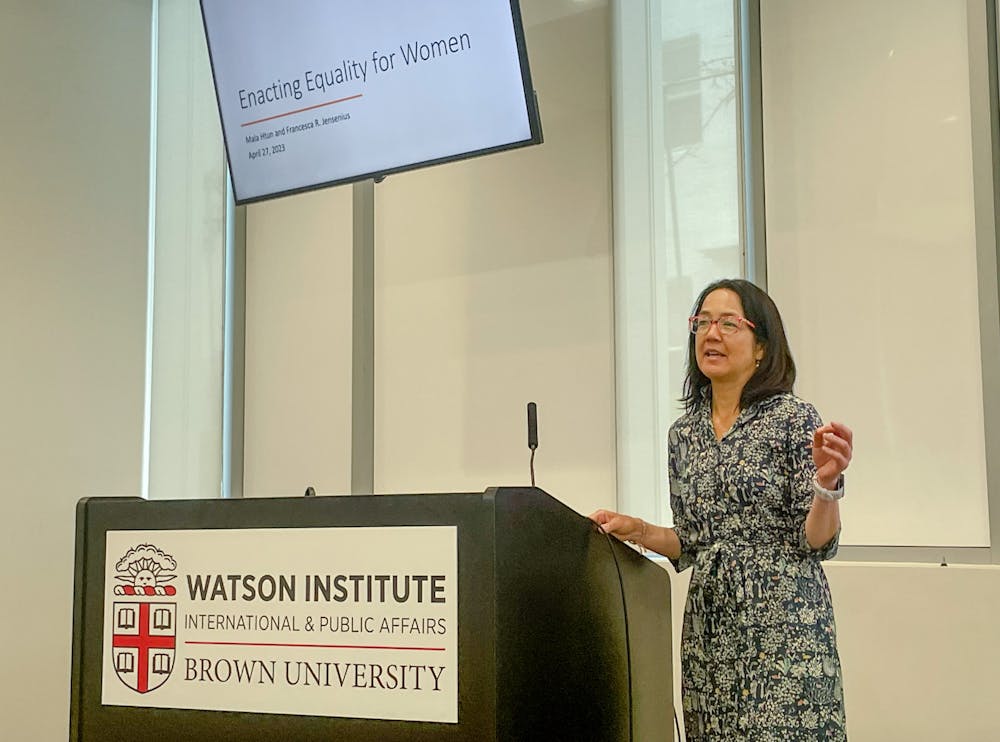The Department of Political Science hosted the final event of its distinguished lecture series on “Challenges for Democracy” Thursday. Entitled “Enacting Equality for Women,” the lecture highlighted the work of Mala Htun, an American political scientist and professor at the University of New Mexico.
Eric Patashnik, professor of public policy and political science and chair of the Department of Political Science, said that when deciding who to invite as the series’ final lecturer, “Mala’s name came up multiple times as somebody who has done cutting-edge work.”
Htun’s lecture drew heavily on research and analyses presented in her three books, which she said focus on the “changes in family law, reproductive rights, work-life balance, access to childcare and parental leave and the folding of workplaces that took place across the Global North and Global South starting in the late 1960s.”
Her current work examines how changes in law interact with norms and de facto practices — a topic she called “the backside of the women’s rights revolution.”
Htun said she is “trying to address the ‘so what’ question: So we have a lot of rights for women in the books? Has it made a difference? Has it changed people’s lives?” Htun believes that, in many cases, people’s behavior is not changing, but rather the law is progressing to “catch up with behavior.”
Htun laid out three major mechanisms that shape the scope of women’s rights: money, coercion and the law. Through her fieldwork, interviews, surveys and ethnographic research, Htun has investigated how states exert power through these mechanisms to “target individuals” and “change collective actors.”
Addressing the wage gap between men and women, Htun said that pushing back against the economic discrimination women face today relies on a change in norms, with men contributing more in the domestic sphere. She cited Norway’s success in enacting paid parental leave for both men and women as an example of financial incentives that oppose gender norms.
But according to Htun, efforts to expand gender equality are challenged by outside institutions, including corporate overtime culture and tax and pension systems.
“Even though the state is throwing tons of money at this problem and has been for decades, there are a lot of countervailing institutions that are pushing back,” she said. “The money thing works, but only if there is a supportive context.”
Htun’s lecture concluded with a look at the second-wave women’s movement and the laws that governed the first generation of the movement’s participants. She noted how these laws began to link “formally disparate phenomena,” such as female genital mutilation, intimate partner violence and harrassment, among other things. Htun interprets these laws as an improvement in the fight for gender equity.
“Things are terrible,” Htun said, citing how one in three women globally have experienced an act of violence in their lifetimes. “But it’s getting better.”
There’s “a growing trend in favor of feeling more empowered to talk about … violence experienced,” Htun said. “These trends are all consistent with a change in norms.”
Alexandra Josephson ’23, who attended Thursday’s event, “thought the lecture was so great.”
Jennifer Horan, an audience member and lecturer in English and cultural studies at Bryant University, said that she internalized the lecture’s contents through the lenses of “philosophy and literature.”
“What I got out of it was this difficult causality in terms of the implementation and the impact,” Horan said. “It’s a kind of poetics at the end of the day … the changing behaviors … and different angles and approaches all together.”

Sofia Barnett is a University News editor overseeing the faculty and higher education beat. She is a junior from Texas studying history and English nonfiction and enjoys freelancing in her free time.





